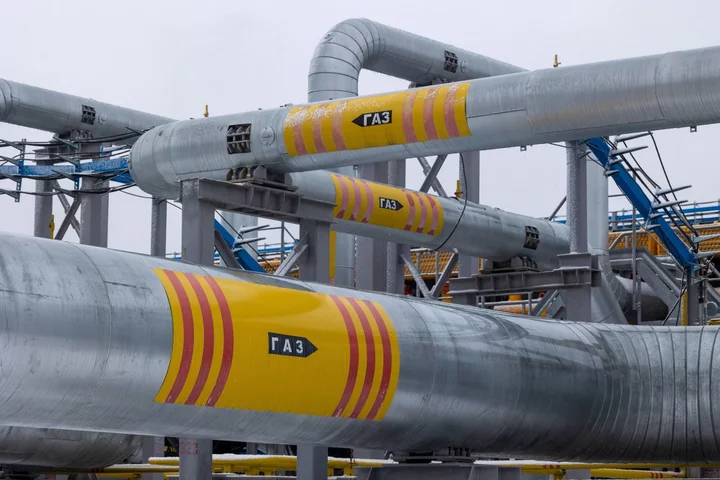Russian authorities are considering raising the tax burden on the nation’s gas industry to help finance a return to full subsidies for oil refiners, as the government seeks to support the domestic fuel market without straining the country’s budget.
The plan, if agreed upon, would raise the gas-production tax, also known as the MET, according to three people familiar with the matter, who requested anonymity as the discussions aren’t public.
It hasn’t been decided whether the move would apply only to gas giant Gazprom PJSC, or if it would include other Russian gas producers, two of the people said.
The hike could come on top of another MET increase for Gazprom that is currently under consideration, according to two of the people. No final decision has been taken, and discussions on sources for the downstream payouts are still ongoing.
Russia’s budget is strained by the costly war in Ukraine, social spending and international sanctions that have dented its oil and gas revenues. With presidential elections scheduled for March, the Kremlin and the government want to make sure the domestic fuel market is stable, and that diesel and gasoline don’t put additional inflationary pressure on the nation’s economy.
The press offices for Russia’s government, Finance Ministry, Energy Ministry and Gazprom did not immediately respond to Bloomberg requests for a comment on the discussions around financing of the downstream subsidies.
Refiner Subsidies
Russia’s government in early October announced a return to full subsidies for the nation’s oil refiners, after President Vladimir Putin criticized a previous decision to halve them to cut budget spending. The return is set to ensure Russian refineries are sufficiently compensated for the difference between fuel prices at home and abroad, the government said.
Given the significant size of the downstream payouts — which reached some $3 billion for August alone amid a weaker ruble and rising global oil prices — Russia’s government is taking its time to determine how the payouts may be financed.
Earlier this month, Russian media reported First Deputy Energy Minister Pavel Sorokin as saying the subsidies may be partly financed with the money the budget saved by not making the September payout. Authorities are considering a range of non-oil revenue sources for the payouts, Sorokin said.
Russia’s gas industry, and in particular state-controlled Gazprom, has traditionally been a cash cow for the nation’s budget. Last year, amid the growing costs of the war in Ukraine, the government — as a key Gazprom shareholder — voted against the 2021 payment of dividends and the money was instead directed to the national budget in form of a windfall tax.
A Russian parliamentary committee this month recommended approving a bill that raises the MET for Gazprom between August 2024 and the end of 2026. The move is set to generate more than 100 billion rubles ($1 billion) per year for the nation’s budget, Deputy Finance Minister Alexei Sazanov said, as reported by Russian media.

